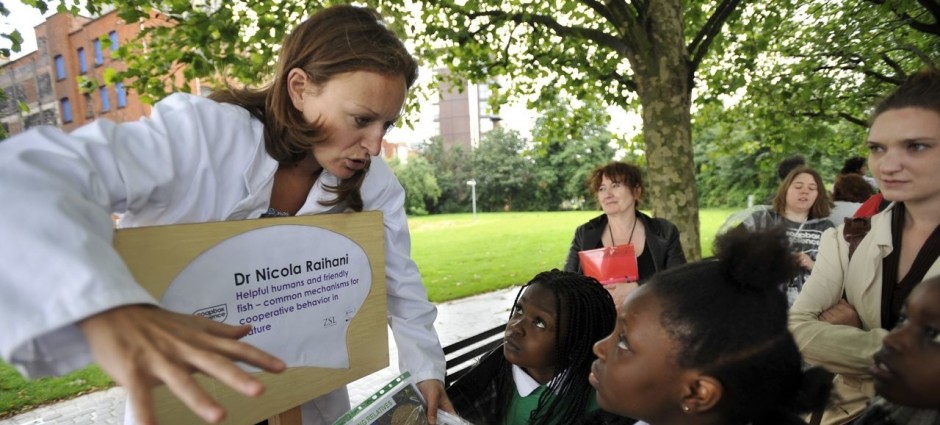 Dr. Antonia Misch (@AntoniaMisch), LMU Munich, is taking part in Soapbox Science Munich on 7th July where she will give a talk: “Wir und ihr: Warum sind Vorurteile wichtig? (Us and them: Why stereotypes matter (for better and for worse))”
Dr. Antonia Misch (@AntoniaMisch), LMU Munich, is taking part in Soapbox Science Munich on 7th July where she will give a talk: “Wir und ihr: Warum sind Vorurteile wichtig? (Us and them: Why stereotypes matter (for better and for worse))”
SS: Why did you choose a scientific career?
AM: I love learning and exploring new things, and my work allows me to think about so many interesting questions every day! As a social developmental psychologist I study the development of social behavior, and so the questions I am thinking about are really relevant to many issues in our society. The most exciting part is that I can actually investigate and answer these questions by running real experiments.
SS: How did you get your current position?
AM: After high school I was thinking about studying psychology, but wasn’t sure whether I wanted to become a psychotherapist. At that time I didn’t know what else to do with a psychology degree. Then I heard that the psychology department at the local Max Planck Institute was recruiting interns to run psychological studies with children. I did an internship there and loved the work so much that I ended up staying until after my PhD. After that I moved to the States for a postdoc position at Yale in order to study the development of intergroup cognition. When I returned to Germany 2 years later I was excited to get this job at LMU Munich, and that’s where I am now.
SS: What do you do in your everyday work life?
AM:
- Reading & Writing & Thinking
- Teaching
- Running experiments/ Supervising students who are running experiments
- Statistical analysis
SS: What is the most exciting aspect of your research?
AM: I love the freedom to investigate pretty much any question that I am interested in (within my field, of course). Another exciting aspect is that my research allows me to connect and collaborate with many interesting researchers from all over the world.
SS: What challenges do you encounter in science?
AM: One needs perseverance, patience and the ability to juggle multiple projects at the same time. Job insecurity is also a huge challenge.
SS: What are your most promising findings in the field?
AM: In my dissertation research I found that already 5-year-old children value group loyalty, and that they also show loyalty to their group themselves, sometimes by covering up their group members’ moral transgression.
One of my current studies shows a promising avenue to reduce children’s ingroup bias (which is a natural tendency to prefer members of the own group to members of another group): I found that the mere anticipation to collaborate with members of the outgroup is sufficient to diminish ingroup bias.
 SS: What motivates you to give a talk in Soapbox science?
SS: What motivates you to give a talk in Soapbox science?
AM: I think that science, and understanding how science works, is important for everyone. Therefore, we scientists have to do a better job in making it understandable and accessible for the general public.
Furthermore, I would like to help to increase the visibility of non-stereotypical scientists in order to challenge a few beliefs about the world that perpetuate societal inequality. For example, when it comes to gender equality most people think that we live in an equal world because theoretically every woman has the same choices and chances as a man. But what most people don’t see is that from early on children’s desires and beliefs are shaped by the world they see and experience. And when young children see that all the powerful and smart positions are filled by people who are White and male, they will automatically start to believe that there is a deeper reason for that, such as that men might be inherently smarter than women. Research from the US shows that already 6-year-old girls think that men are smarter than women, and this belief impacts their own fledgling identity directly – girls perceive themselves as less smart compared to boys of the same age (needless to say that these beliefs are wrong). But educational and career choices are made based on the assumptions of what one perceives as achievable and suitable for oneself, and thus certain stereotypes prevent people who do not fit the stereotype from pursuing a particular career, for example in academia. I would not only like to challenge these stereotypes, but also raise awareness about the development and existence of implicit assumptions.
SS: Do you have a few words to inspire other female scientists? What can we do to attract more women to STEM fields?
AM: My advice for young women in academia (or actually in any field) would be: Don’t be intimidated by the confidence of your (male) colleagues. It does not mean that they are smarter or more knowledgeable than you, but most likely it is due to the fact that we were raised in a society that fosters boys’ and men’s confidence more than the confidence of girls and women.
Furthermore, I think women in science have to be more visible. So we should talk more about our research and our passion for research in public, as well as try to be good and approachable mentors for our students – all of them!
